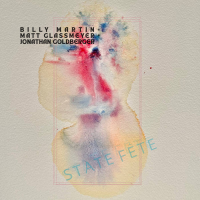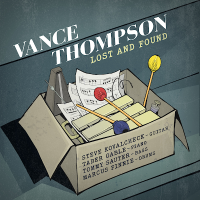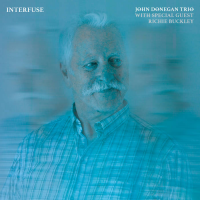Home » Jazz Articles » Extended Analysis » George Mraz & Iva Bittova: George Mraz & Iva Bittova: Mo...
George Mraz & Iva Bittova: George Mraz & Iva Bittova: Moravian Gems
 George Mraz & Iva Bittova
George Mraz & Iva Bittova Moravian Gems
CubeMetier
2007
The United States is a large country and anything but culturally homogenous. Americans routinely make geographical distinctions among themselves, politically (red state vs. blue state), religiously (Southern Baptist vs. New England Baptist), and of course, musically. All three of America's indigenous musical art forms draw such lines: Southern rock is considered a distinct subgenre of rock'n'roll; Chicago blues is distinguished from its elder Mississippi cousin; and the West Coast jazz style has long been contrasted to that of New Orleans or New York/Philadelphia.
However, Americans—not noted for their familiarity with world geography—do not readily make such distinctions with others. Latin Americans, Africans, Asians and Europeans routinely complain that Americans tend to lump the peoples and cultures of huge and much differentiated regions into one general stereotype. The same tendency holds true with individual countries, as Mexicans and Brits (to name just two prime examples) will attest.
Evidently, citizens of the Czech Republic have the same complaint, since an impulse to educate Westerners about that country's nuances seems to underlie Moravian Gems, a project spearheaded by its two most internationally acclaimed jazz musicians, bassist George Mraz and pianist Emil Viklický. The two men—who both grew up in Moravia—first met at a 1976 Hungarian jazz festival, and they began discussing the idea for this recording ten years ago.
As an independent nation, Czechoslovakia lasted less than a century. It came into being after World War I dissolved the Austro-Hungarian Empire, was briefly carved up and overrun by the Nazis, was then reconstituted under communist rule after World War II, and ceased to exist in 1993 following its "Velvet Divorce." In a quiet anticlimax to the fall of the Iron Curtain that went largely unnoticed in America, Czechoslovakia (similarly to the former Yugoslavia but with no bloodshed) split itself along long-standing ethnic lines into two countries, the Czech Republic and Slovakia.
But that's not quite the whole story. The present-day Czech Republic is comprised of two distinct regions, Bohemia and Moravia, each with its own culture, dialect...and music. While admitting that it is an oversimplification, Viklický explains the difference with his characteristic puckish humor. "Bohemians drink beer," he points out, "and their folk music is mostly not harmonically interesting." By contrast, he continues, "Moravians drink wine, and their folk melodies use...interesting old modal scales."
Another notable feature of Moravian folk music, one to which Viklický often points, is the use of both the major and minor third in one song. A perfect example is "Sweet Basil," loosely based on an old folk song with four bars in E-Minor and four in E-Major.
"Loosely" may be considered an understatement by some. Viklický, who arranged most of the music, notes (with tongue firmly in cheek), "We take a folk tune and turn it inside out, much to the 'delight' of folklore purists." An eclectic-minded musician who has also studied classical music extensively, Viklický's claim to fame (what marketing analysts might term his "brand") is his unique melding of the melodicism and tonalities of Moravian folk music with modern jazz harmonies and classical orchestration in a distinctly individual style.
Regarded as the patriarch of Czech jazz, Viklický is sometimes seen as a successor to Leos Janacek, a 19th-century Moravian composer who also was inspired by the folk sources of that region. He is very much in his element here, and as usual, Viklický's playing is a lively, balanced combination of traditional and modern aesthetics.
The presence of vocalist Iva Bittova adds another dimension to Viklický's trademark recipe. An accomplished violinist with strong musical bloodlines, Bittova, whose background lies in classical, avant-garde and ethnic music, had virtually no experience with jazz prior to this recording. Nonetheless, she managed to get in the swing of things, literally and figuratively. Her vocalese excursion on "Gossip" and scat improvisations on "A Little Bird's Flown Over" would make Sarah Vaughan and Ella Fitzgerald smile.
On "Fetching Water," an admittedly "daring" adaptation by Viklický, a drastic reharmonization is further recast by the use of a funky 5/4 time signature, and Bittova sounds thoroughly at home. She also shows her instrumental chops in "A Little Wreath," improvising in parallel with vocalese and on the violin. Bittova's versatility and innate musicianship are obvious, and the purity of tone and timbre of her voice would be remarkable regardless of the genre or style in which she chose to sing.
The multi-talented Bittova is also a film actress, and she demonstratess a thespian's flair for the dramatic in "Little Apple," when she prefaces the lyrics by imitating the wind soughing through the leaves of a tree. Her father was a bassist of some stature before his premature demise in 1984, and Bittova spoke of a strong emotional response to Mraz's playing.
The chemistry and comfort level needed for musicians to bridge different backgrounds is very much in evidence, both in the music and the liner notes. Indeed, the regard and respect with which she, Mraz and Viklický speak of each other is that of a mutual admiration society.
And notwithstanding the significant contributions of Viklický (who also composed several tunes for the CD) and Bittova's prominence, Mraz was leader of the session, and his presence is up-front from the very outset. A quiet man whose good taste and selflessness can make him, if not invisible, verge on being "translucent," he admits to having deferred his own projects for many years.
What with being constantly in demand as a sideman and session player, as well as leading his own combo with Richie Beirach, Mraz confessed that he "just never got around to it." Here, he puts his incomparable stamp on the music early and often, from the melodic pizzicato solo on "Destiny" to the arco work on "Gossip."
The Country Formerly Known as Czechoslovakia is often referred to as the crossroads of Europe, and its central location has been a very mixed blessing for the people who live there. Economically, a crossroads is a great place to do business; politically and militarily, however, it is a likely spot to get run over by heavy traffic, so to speak. The first two tracks are testimony to the almost unceasing series of wars, invasions and foreign occupations endured by the Czechs and Slovaks over the centuries.
"Destiny" is the lament of a young Moravian draftee from his barracks in Prespurk (today known as Bratislava, the capital city of Slovakia) and his sweetheart back home. The elegant brushwork on this cut by drummer Laco Tropp, Viklický's long-time sideman and a native of that city, bears mention. "Austerlitz, a reference to the famous battle of 1805, is the song of a young woman seeing her brother's riderless horse returning from the war, and his fellow solders who must tell her that she will never see him again.
The promise of youth cut short on a battlefield is one of the timeless, universal themes that these songs—like folksongs the world over—touch upon: the sweetness, intoxication and uncertainty of first love, the loneliness of separation, the heartache of infidelity, the nostalgic memory of a childhood home. While Bittova sings in Czech, the lyrics, song titles, and liner notes are helpfully presented in English as well. Their poignancy, again like folk music everywhere, largely comes from a child-like (not childish) quality, expressing the collision of youthful dreams with life's hard realities.
Enlightening liner notes are contributed by Doug Ramsey, known to many at AAJ for his recent book Take Five: The Public And Private Lives Of Paul Desmond, which won the 2006 award for best book from the Jazz Journalists Association. Mraz and Viklický professed surprise when Ramsey pointed out to them that the first four bars of the melody of "Walking From Peszt," a traditional folk tune arranged by Viklický, are identical to the beginning of Nat Adderley's "The Old Country."
Now, both Mraz and Viklický (who reharmonized the tune with what he termed "Bill Evans-type chords") attended Boston's Berklee School of Music, and Mraz has played with pianist Oscar Peterson, saxophonist Stan Getz, trumpeter Chet Baker and pianist Tommy Flanagan, among others. So it's altogether likely that they both heard plenty of the Adderley brothers' music in their formative years.
Of course, Nat and his more famous brother Julian (a.k.a. Cannonball) were not exactly strangers to the music of eastern European, given the long tenure of the late Austrian keyboardist Josef Zawinul with their band. Nor were the Adderleys averse to the application of jazz sensibilities to folk music, as witnessed by their recording Big Man (Fantasy, 1975) inspired by the mythical black hero figure John Henry. In any case, Mraz had a light-hearted explanation for the coincidence: "Nat must have been Moravian," he suggested with a chuckle.
The production values are superb across the board, and the clear, vivid sonic quality of this recording does full justice to the virtuoso musicianship of all four artists and the subtle grace notes, trills and vibratos they employ. Viklický makes a special point of remarking on the contributions of Ivan Sokol, apparently Prague's first call piano tuner for recording sessions. His instrument, as Viklický gushes, is indeed "faultlessly tuned" throughout.
For jazz fans looking to stretch their musical and cultural horizons a bit, this CD is highly recommended.
Tracks: Destiny; Austerlitz; Oh, Love, Love; Pennyroyal; A Little Bird's Flown Over; Walking From Peszt; Sinfonietta; Dying Of Love; Little Apple; In The Town Of Olomouc; Fetching Water; Sweet Basil; A Little Wreath; Gossip.
Personnel: George Mraz: bass; Iva Bittova: vocals, violin; Emil Viklický: piano; Laco Tropp: drums.
Track Listing
Destiny; Austerlitz; Oh, Love, Love; Pennyroyal; A Little Bird's Flown Over; Walking from Peszt; Sinfonietta; Dying of Love; Little Apple; In the Town of Olomouc; Fetching Water; Sweet Basil; A Little Wreath; Gossip.
Personnel
George Mraz
bassGeorge Mraz: bass; Iva Bittova: vocals, violin; Emil Viklicky: piano; Laco Tropp: drums.
Album information
Title: George Mraz & Iva Bittova: Moravian Gems | Year Released: 2007 | Record Label: Unknown label
Tags
PREVIOUS / NEXT
Support All About Jazz
 All About Jazz has been a pillar of jazz since 1995, championing it as an art form and, more importantly, supporting the musicians who make it. Our enduring commitment has made "AAJ" one of the most culturally important websites of its kind, read by hundreds of thousands of fans, musicians and industry figures every month.
All About Jazz has been a pillar of jazz since 1995, championing it as an art form and, more importantly, supporting the musicians who make it. Our enduring commitment has made "AAJ" one of the most culturally important websites of its kind, read by hundreds of thousands of fans, musicians and industry figures every month.























